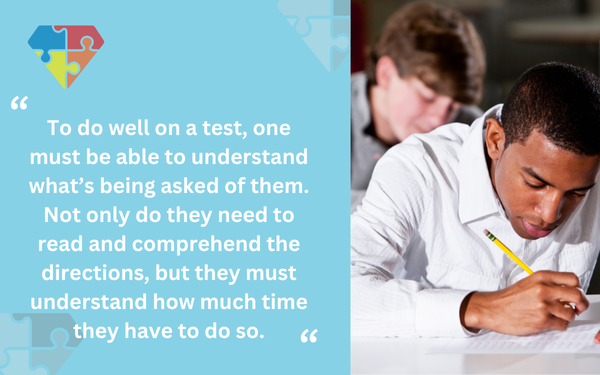Utilizar el ABA para aumentar la confianza en los exámenes
La realización de exámenes es una parte fundamental de la educación en Estados Unidos. Los estudiantes se examinan de diversas formas desde la escuela primaria hasta la universidad, si es que llegan tan lejos.
Los exámenes sirven para medir el progreso de los alumnos en clase y su capacidad para dominar las destrezas y lecciones que se enseñan. Desarrollar la confianza necesaria para presentarse a un examen lleva tiempo, por eso la dificultad de los exámenes aumenta gradualmente con el tiempo.
Independientemente de su edad y grado escolar, los niños con trastorno del espectro autista (TEA) pueden enfrentarse a retos adicionales a la hora de realizar exámenes. De hecho, las presiones asociadas a la realización de exámenes pueden provocarles ansiedad y hacer que se sientan abrumados rápidamente.
El análisis conductual aplicado (terapia ABA) es el patrón oro de los planes de tratamiento para niños con espectro autista, y puede beneficiar a los niños de muchas maneras a lo largo de su trayectoria educativa.
En este artículo hablaremos de cómo la terapia ABA puede aumentar la confianza de los niños autistas a la hora de realizar exámenes.
Índice
Les ayuda a desarrollar habilidades básicas
La terapia ABA ayuda a los niños con TEA a desarrollar habilidades esenciales que se convierten en la base de muchas cosas diferentes en sus vidas. Esto incluye habilidades de comunicación e interacción social, así como la capacidad de gestionar sus emociones, permanecer en la tarea, siga las instrucciones y mantener la concentración.
Estas destrezas básicas son, en muchos sentidos, los cimientos de la confianza a la hora de realizar un examen.
Por ejemplo, para completar los exámenes a tiempo, los niños deben ser capaces de prestar atención y permanecer concentrados durante el tiempo asignado. Deben ser capaces de seguir las instrucciones que se les dan y completar todas las tareas de principio a fin.
Sea cual sea el tipo de examen al que se presenten y la asignatura a la que se refieran, los niños tendrán que poner en práctica esas destrezas si quieren tener éxito.
Mediante diversas estrategias y herramientas, los terapeutas ABA pueden trabajar para mejorar la atención del niño, su concentración, su capacidad para completar tareas y seguir instrucciones. Utilizando diversos estímulos, ayudas visuales y refuerzos positivos, los niños aprenderán las habilidades básicas, que acabarán generalizando en todos los entornos y escenarios.
Les ayuda a entender lo que se les pide
Para hacer bien un examen, uno debe ser capaz de entender lo que se le pide. No sólo tiene que leer y comprender las instrucciones, sino que debe entender de cuánto tiempo dispone para hacerlo.

Esto puede parecer obvio para los alumnos experimentados en etapas posteriores de su trayectoria educativa, pero no es tan sencillo para los niños más pequeños que acaban de empezar o para los alumnos con autismo.
Deben dominar competencias como gestión del tiempo y organización, así como interpretar tareas a veces complejas.
La terapia ABA puede enseñar a los niños a hacerlo dividiendo las tareas complejas en pasos más pequeños y manejables. Mediante una estrategia denominada análisis de tareasLos terapeutas enseñan a los niños estas tareas paso a paso, utilizando indicaciones, ayudas y refuerzos positivos hasta que el niño domina el primer paso, y sólo pasan al siguiente paso de la secuencia hasta que lo consiguen.
Con el tiempo, esto ayuda a los niños con TEA a aprender a comprender tareas más complejas, lo cual es una habilidad que se traducirá bien a la hora de hacer exámenes.
Les ayuda a mejorar los comportamientos perturbadores
Completar los exámenes con éxito requiere concentración y atención. Los niños con TEA, sin embargo, pueden enfrentarse a ciertos retos que conducen a conductas disruptivas que obstaculizan su capacidad para hacerlo.
Cuando se sienten abrumados o ansiosos, por ejemplo, algunos niños autistas pueden adoptar conductas autoestimulatorias. Aunque este comportamiento no siempre es perjudicial, sin duda puede alterar su capacidad para completar un examen.
La terapia ABA ayuda a reducir esos comportamientos perturbadores que podrían interferir en la concentración del niño mientras realiza un examen. De hecho, un aspecto importante de la terapia ABA es enseñar conductas de sustitución y ayudar a los niños con TEA a gestionar sus emociones.
A través de muchas estrategias diferentes, los terapeutas ABA pueden dotar a los niños con espectro autista de herramientas para autorregularse y otros mecanismos de afrontamiento que pueden utilizar si se sienten ansiosos o abrumados.
A medida que adquieren estas habilidades, los niños con TEA pueden confiar más en su capacidad para volver a centrarse en sí mismos si se sienten ansiosos o abrumados, lo que puede hacer que adquieran confianza a la hora de realizar un examen.
Blue Gems ABA enseña a los niños con TEA habilidades básicas
Para ganar confianza en los exámenes hay que desarrollar habilidades básicas que resulten prácticas en la vida cotidiana. Esto incluye la capacidad de concentrarse, seguir instrucciones, mantenerse en la tarea, estar atento, organizarse y gestionar las emociones.
En Blue Gems ABANuestro equipo de terapeutas experimentados ayuda a los niños con TEA a desarrollar estas habilidades fundamentales para que puedan mejorar su confianza a la hora de realizar exámenes. Estas habilidades y otras más pueden servir como grandes bloques de construcción a medida que ayudamos a nuestros pacientes a vivir de forma más independiente.
Para más información Contacto hoy.




